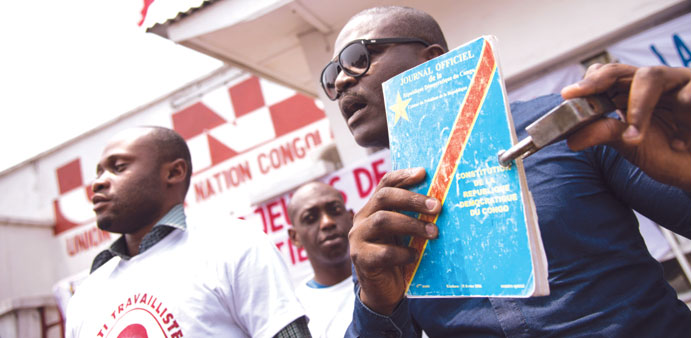A protester holds the constitution of the Democratic Republic of the Congo locked with a padlock in front of the UNC opposition party’s headquarters in Barumbu, near Kinshasa
Reuters/Kinshasa
The Democratic Republic of the Congo’s opposition pledged to escalate its campaign against a possible third term for President Joseph Kabila after police dispersed a protest march with teargas in the capital Kinshasa yesterday.
Anti-government protests were suppressed in at least three other towns, the opposition said.
In Butembo, in the eastern province of North Kivu, police fired teargas and threw stones at protesters, according to Fabrice Kakubuzi, a local civil society co-ordinator.
Provincial authorities in Kinshasa refused to authorise the march in the capital, organised by a coalition of leading opposition groups, arguing that they had already permitted another rally yesterday and could not secure two of them.
The international community has spent billions of dollars and deployed a 21,000-strong UN peacekeeping mission in the Congo in the wake of a 1998-2003 civil war in which millions of people died mostly from starvation and disease.
However, stability has remained elusive in the giant nation at the heart of Africa and dozens of armed groups still prowl its mineral-rich east.
Vital Kamerhe, president of the Union for the Congolese Nation (UNC) opposition party, said that police had tear-gassed protesters near the central train station.
Several protesters were injured or arrested by police, he said.
Opposition supporters had voiced anger after UNC General Secretary Jean-Bertrand Ewanga was sentenced to one year in prison on Thursday for insulting Kabila at a protest in August.
The authorities accused Ewanga of inciting tribal tensions by demanding at the rally that Kabila return to Rwanda when his second term expires in 2016 – repeating an opposition accusation that the president was born in the Congo’s tiny eastern neighbour.
“We know that they have imprisoned Ewanga but they haven’t imprisoned the spirit of Ewanga,” Kamerhe said, vowing more protests.
A crowd of about 100 demonstrators gathered later outside UNC headquarters, some holding anti-government placards.
“Kabila 2016: Let’s avoid a Congolese Spring,” read one.
A statement from the opposition movement, the Social and Political Forces for the Unity of Action, said that protests took place in several other towns in addition to Kinshasa and Butembo, including Bukavu in North Kivu province and Masi-Manimba in the west.
“The Social and Political Forces invite the entire Congolese population to participate massively, as today, in marches that they will organise all across the republic in the near future,” it said, calling for its detained supporters to be released.
The suppression of the protests is likely to inflame tensions between Kabila’s government and the opposition.
Allies of the 43-year-old president have grown increasingly vocal in their demands for an amendment to the constitution to remove a limit on the presidential mandate to two five-year terms.
Kabila took office in 2001 shortly after the assassination of his father, then-president Laurent Kabila.
He was elected president for the first time in an election five years later.
He won re-election in 2011 in a poll that was criticised by the UN peacekeeping mission for irregularities.
Kabila has not publicly ruled out another run despite pressure from the United States to step down in 2016.

